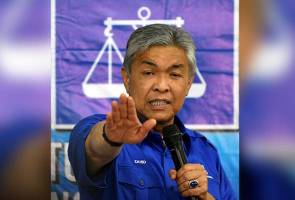Taking The Harder Option
THE Deputy Prime Minister has never hidden the fact that he needs to improve his command of the English language. In fact, he openly tells his friends that he has to brush up on his English now that he needs to speak at international meetings.
So it comes as no surprise if his English speaking skills at the United Nations General Assembly (UNGA) last week was not exactly posh and smooth.
Let’s face it – Datuk Seri Dr Ahmad Zahid Hamidi is not the product of a British boarding school nor is he from a top notch or elite university. In fact, he did not even have the benefit of studying at a missionary school, where English was the medium of instruction.
Dr Ahmad Zahid came from an entirely different background. His parents were not aristocrats nor were they from a lineage of Umno leaders. He wasn’t born with a silver spoon in his mouth, so to speak.
He had his primary education at SK Sungai Balai and secondary at SM Agama Izuddin Shah in Ipoh and then Sek Tengku Ampuan Rahimah in Kelang. These are schools not in the category of St John’s Institution, St Xavier’s Institution, Penang Free School or the Royal Military College.
Like it or not, his maiden speech at the UNGA has become the subject of controversy on social media, with some taking pot shots at his purported lack of English proficiency.
Despite his experience as an orator, he seemed somewhat uncomfortable on the international platform and he had a little difficulty handling some of the terminologies and pronunciation of words he doesn’t use on a regular basis.
But I think Malaysians should give him credit for trying. His message was easily understood by most of us.
He could easily have used Bahasa Malaysia, played the nationalistic card and claimed that he was the first Malaysian leader to use the national language at the UN.
He could even have quoted Quranic verses to push his religious credentials. After all, such messages were meant for the Malaysian audience.
But he chose English -- the more difficult option. He has been ridiculed but he shouldn’t give up. Practice makes perfect and from now, he should try to deliver as many speeches as possible in English.
He shouldn’t listen to PAS vice-president Iskandar Samad, who has been quoted as saying that Zahid Hamidi shouldn’t have given his address in English.
He reportedly said that many other leaders of countries where English is not the native language would not think of using English at the UN as they are always proud of their own language.
Iskandar is a classic case of hypocrisy, a disease which inflicts many of our politicians. He wrote his comments in English “for the benefit of Facebook friends all over the world.”
That is the point. If the DPM had used BM, he would not have reached the entire planet. Unlike at the UN, most people don’t have a translator at hand and like it or not, English is the universal language. Iskandar should know that at World Cup football matches, the referees use English, even if it's “half-past six,” or “half-baked” as we often say.
Dr Ahmad Zahid’s English is heavily Malay accented but then, UN secretary-general Ban Ki-moon’s English is Korean accented; the same applies to leaders from India despite their strong grounding in English.
If there’s one main point in this episode that we need to address, it is this – English, whether written or spoken, is terribly important but we are losing the edge we once had. Teachers who have failed in their English tests are teaching our children English and that is a frightening fact.
Our hypocritical leaders, who tell Malaysians to send their children to national schools, are packing their own children off to boarding schools in UK, or private and international schools in Malaysia.
It isn’t vernacular or national schools causing disunity, as erroneously claimed, that we should worry about; the issue that we should all be concerned about is the declining standard of education in Malaysia -- that includes the shocking standard of English taught in our schools or the lack of it.
Most of us cringe with embarrassment at the kind of English posted on Facebook by some of our ministers. It is horrendous and no one seems to be telling them to correct it before their reputation is further damaged. A few seem totally incapable of speaking English at all.
-The Star-
Those who laugh at Dr Ahmad Zahid should first ask themselves whether their command of Bahasa Malaysia is any good, what more give a speech in the national language.
These are the Malaysians who turn up at government departments, using English and expecting the clerks to be able to reply in crisp Queen’s English. And when they can’t, they express shock, dismay, followed by harsh criticism.
In Belgium, Switzerland or Holland, people are able to converse proficiently in a few European languages, including English. Many Malaysians, on the other hand, lack that multi-lingual ability; those in rural areas are sometimes ridiculed when they try to speak English.
Mr Deputy Prime Minister, ignore the criticism and continue to speak English. In fact, make more speeches in English!
-The Star-
So it comes as no surprise if his English speaking skills at the United Nations General Assembly (UNGA) last week was not exactly posh and smooth.
Let’s face it – Datuk Seri Dr Ahmad Zahid Hamidi is not the product of a British boarding school nor is he from a top notch or elite university. In fact, he did not even have the benefit of studying at a missionary school, where English was the medium of instruction.
Dr Ahmad Zahid came from an entirely different background. His parents were not aristocrats nor were they from a lineage of Umno leaders. He wasn’t born with a silver spoon in his mouth, so to speak.
He had his primary education at SK Sungai Balai and secondary at SM Agama Izuddin Shah in Ipoh and then Sek Tengku Ampuan Rahimah in Kelang. These are schools not in the category of St John’s Institution, St Xavier’s Institution, Penang Free School or the Royal Military College.
Like it or not, his maiden speech at the UNGA has become the subject of controversy on social media, with some taking pot shots at his purported lack of English proficiency.
Despite his experience as an orator, he seemed somewhat uncomfortable on the international platform and he had a little difficulty handling some of the terminologies and pronunciation of words he doesn’t use on a regular basis.
But I think Malaysians should give him credit for trying. His message was easily understood by most of us.
He could easily have used Bahasa Malaysia, played the nationalistic card and claimed that he was the first Malaysian leader to use the national language at the UN.
He could even have quoted Quranic verses to push his religious credentials. After all, such messages were meant for the Malaysian audience.
But he chose English -- the more difficult option. He has been ridiculed but he shouldn’t give up. Practice makes perfect and from now, he should try to deliver as many speeches as possible in English.
He shouldn’t listen to PAS vice-president Iskandar Samad, who has been quoted as saying that Zahid Hamidi shouldn’t have given his address in English.
He reportedly said that many other leaders of countries where English is not the native language would not think of using English at the UN as they are always proud of their own language.
Iskandar is a classic case of hypocrisy, a disease which inflicts many of our politicians. He wrote his comments in English “for the benefit of Facebook friends all over the world.”
That is the point. If the DPM had used BM, he would not have reached the entire planet. Unlike at the UN, most people don’t have a translator at hand and like it or not, English is the universal language. Iskandar should know that at World Cup football matches, the referees use English, even if it's “half-past six,” or “half-baked” as we often say.
Dr Ahmad Zahid’s English is heavily Malay accented but then, UN secretary-general Ban Ki-moon’s English is Korean accented; the same applies to leaders from India despite their strong grounding in English.
If there’s one main point in this episode that we need to address, it is this – English, whether written or spoken, is terribly important but we are losing the edge we once had. Teachers who have failed in their English tests are teaching our children English and that is a frightening fact.
Our hypocritical leaders, who tell Malaysians to send their children to national schools, are packing their own children off to boarding schools in UK, or private and international schools in Malaysia.
It isn’t vernacular or national schools causing disunity, as erroneously claimed, that we should worry about; the issue that we should all be concerned about is the declining standard of education in Malaysia -- that includes the shocking standard of English taught in our schools or the lack of it.
Most of us cringe with embarrassment at the kind of English posted on Facebook by some of our ministers. It is horrendous and no one seems to be telling them to correct it before their reputation is further damaged. A few seem totally incapable of speaking English at all.
-The Star-
Those who laugh at Dr Ahmad Zahid should first ask themselves whether their command of Bahasa Malaysia is any good, what more give a speech in the national language.
These are the Malaysians who turn up at government departments, using English and expecting the clerks to be able to reply in crisp Queen’s English. And when they can’t, they express shock, dismay, followed by harsh criticism.
In Belgium, Switzerland or Holland, people are able to converse proficiently in a few European languages, including English. Many Malaysians, on the other hand, lack that multi-lingual ability; those in rural areas are sometimes ridiculed when they try to speak English.
Mr Deputy Prime Minister, ignore the criticism and continue to speak English. In fact, make more speeches in English!
-The Star-



